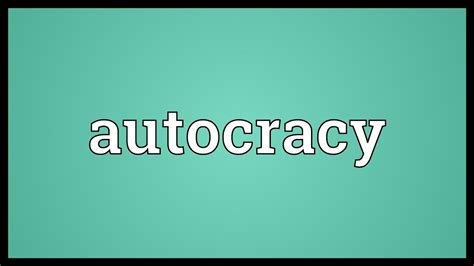
Autocracy: A Critical Examination of Its Role and Future
In the realm of governance, autocracy stands as a significant yet controversial form. This article aims to dissect the essence of autocratic rule, its implications, and the challenges it faces in the modern world. We will also touch upon the interplay between technology and autocratic regimes and the complex process of transitioning towards democratic systems.
Defining Autocracy: Key Characteristics
At its core, autocracy involves centralized control, where decision-making is confined to an individual or a select few. This concentration of power can lead to swift policy execution but also raises concerns about unchecked authority and potential abuses.
Autocracy’s Many Faces
This governance style takes various shapes, from monarchies to more stringent totalitarian regimes. Each form exhibits distinct traits, influencing how societies function under such rule.
Balancing the Scales: Autocracy’s Advantages and Drawbacks
While autocracies are known for their quick decision-making abilities, they often face criticism for suppressing freedoms and human rights. The lack of diverse viewpoints and the risk of corruption are notable drawbacks of this system.
Historical Autocratic Leadership: A Mixed Legacy
History presents a spectrum of autocratic leaders whose impacts range from progressive changes to infamous reigns of terror. These leaders offer insights into the diverse outcomes of autocratic governance.
Autocracy Versus Other Governance Forms
Comparing autocracy with democracies and oligarchies sheds light on the unique aspects of each system. Autocracy’s focus on centralized control contrasts with the individual freedoms championed in democratic systems.
The Societal Influence of Autocracy
The impact of autocratic rule on society is profound, influencing economic growth, social structures, and often leading to disparities and oppression.
Contemporary Autocracies: A Global Overview
In the current global landscape, several nations exemplify autocratic governance, each presenting unique challenges and governance styles.
Technology: A Tool for Autocrats
Technological advancements have provided autocratic regimes with enhanced control mechanisms, from surveillance to media manipulation, presenting both opportunities and challenges for these governments.
Global Politics and Autocracy
The actions of autocratic leaders play a significant role in shaping international relations and global power dynamics.
The Viability of Autocracy in the Modern Era
The future of autocratic regimes hinges on their ability to adapt and respond to both internal and external pressures, with some showing resilience while others face potential decline.
Transitioning from Autocracy to Democracy
The path from autocratic rule to democratic governance is fraught with complexities, requiring strategic planning and inclusive political reform.
Conclusion: Understanding Autocracy’s Role
In today’s world, autocracy presents a unique blend of efficiency and risks, making its study essential for a comprehensive understanding of global governance.
For more information on autocracy, explore these resources:
- Council on Foreign Relations: [Link]
- Freedom House: [Link]
FAQs: Autocracy Uncovered
- What distinguishes autocracy from dictatorship? Autocracy is a broader concept, encompassing various governance systems, including dictatorships.
- Can autocracy foster economic growth? While some autocracies have achieved short-term growth, long-term prosperity typically requires more inclusive governance models.
- What are autocracy’s benefits? Autocracies can provide rapid decision-making and a semblance of stability, but often at the expense of personal freedoms.
- How do autocrats maintain their grip on power? Common strategies include the use of propaganda, extensive surveillance, and suppression of opposition.
- Is a peaceful transition to democracy possible for autocracies? While challenging, some nations have successfully transitioned to democratic systems through careful negotiation and institution-building.
Learn More:
-
Freedom House (URL: https://freedomhouse.org/): Freedom House is an independent watchdog organization that conducts research and analysis on political freedom and democracy worldwide. They provide detailed reports and assessments on the state of democracy and autocracy in different countries.
-
The Encyclopedia Britannica (URL: https://www.britannica.com/): The Encyclopedia Britannica offers comprehensive articles on various political systems, including autocracy. You can find detailed explanations, historical examples, and related articles to deepen your understanding of autocratic forms of government.
-
Council on Foreign Relations (URL: https://www.cfr.org/): The Council on Foreign Relations (CFR) is a nonpartisan think tank that provides valuable insights into global politics and international affairs. They often publish articles, reports, and analysis on different forms of government, including autocracy and authoritarianism.
